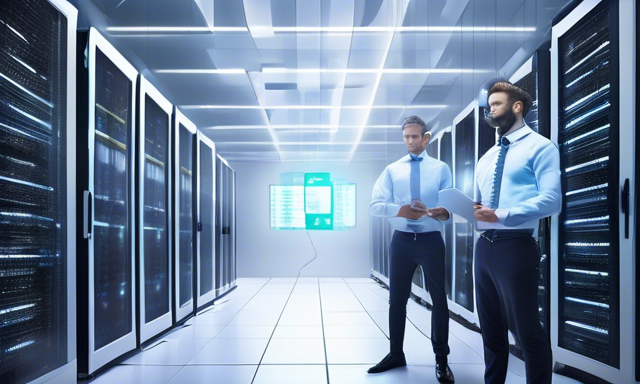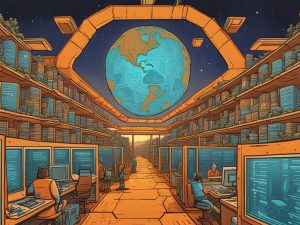Exploring the Future of Data Centers and AI 🌐
As global digitalization expands, the growth of data centers continues to accelerate. The demand for energy-efficient technologies to support artificial intelligence (AI) innovations is shaping the future of these facilities. This year marks a significant moment in recognizing the need for sustainable practices within the tech sector.
Dynamic Growth of Data Centers 🚀
The surge in data centers worldwide remains unabated, highlighting the strategic necessity for major technology companies to evaluate energy solutions that can sustain AI growth. The exploration of various energy sources such as nuclear power, innovative cooling mechanisms, and advancements in quantum computing are currently in consideration. Despite improvements in energy efficiency, experts urge tech firms to confront the true environmental impacts linked to AI by abandoning the conventional fast-paced development ethos.
Somya Joshi, director of global agendas at the Stockholm Environment Institute, emphasized the obscured environmental toll of tech operations. He pointed out that this cost is often masked by immediate technological goals, suggesting that the industry needs to adopt a more mindful approach.
- Challenges include realizing the implications of energy consumption amid a booming data-driven economy.
- Increased digitalization correlates with a rising demand for energy, particularly with the proliferation of generative AI tools.
The Shift Towards Energy Efficiency ⚡
Data centers are pivotal in supporting contemporary cloud computing and AI functionalities. Giampiero Frisio, head of electrification at ABB, reported that their data center sector is anticipated to expand by over 24% this year. The company seeks to meet AI demands, emphasizing the importance of enhancing energy efficiency as a prime strategy. Technologies such as ABB’s HiPerGuard UPS, which offers reliable power supply, are identified as essential for optimizing data center operations.
Frisio reiterated that liquid cooling is crucial for addressing the increasing power density in data servers. As data storage and processing needs evolve, innovative cooling methods are necessary to enhance operational efficiency.
- Liquid cooling leverages water to maintain ideal temperatures for servers.
- The shift to nuclear modular systems is explored as a forward-looking solution for energy needs.
Big Tech’s Nuclear Ventures ☢️
Notable U.S. technology firms like Microsoft, Google, and Amazon have entered into substantial nuclear energy agreements to increase energy supplies available for AI application development. The quest for efficient cooling solutions has coincided with this nuclear push, specifically highlighting liquid cooling’s role in enhancing data center functionality.
French firm Schneider Electric has also taken significant steps toward innovation, acquiring Motivair Corp for $850 million to reinforce its offerings to data centers. The focus is on both liquid cooling solutions and nuclear energy, which aim to enhance operational efficiencies across tech sectors.
- Investment in nuclear energy is growing among major tech companies.
- The integration of AI advancements has led to a reevaluation of sustainable practices in data center designs.
AI and Environmental Responsibility 🌱
Former Google CEO Eric Schmidt mentioned last month that while pursuing an AI-driven future, organizations might need to tackle environmental issues with innovative approaches. However, critics argue against relying solely on technological advancements to solve ecological crises. Joshi challenges the portrayal of technology as a definitive savior, urging a more balanced discussion regarding finite resources and environmental limits.
Both the dialogue around potential AI solutions and the notion of maintaining sustainability within the tech landscape are hotly debated. Industry leaders are now recognizing that applying AI must come with a commitment to responsible consumption and sustainability.
Quantum Computing: A New Frontier ⚛️
Raj Hazra, CEO of Quantinuum, articulated that the advent of generative AI underscores the infrastructure demands necessary for its success, which brings forth both resource sustainability and ethical responsibilities. Quantum computing stands out as a promising avenue for shaping a sustainable tech future.
Hazra noted the notable interest from various sectors in quantum technology, suggesting that advancements in quantum computing can significantly impact AI’s sustainability and ethical governance. The upcoming years may witness a shift toward integrating high-performance computing, AI, and quantum solutions as core components of business infrastructures.
By adopting a proactive stance on sustainability, organizations are better positioned to explore innovative solutions that cater to both technological needs and environmental responsibilities.
Conclusion: A Path Towards Sustainable Innovation 🌍
The trajectory of data centers and their relationship with artificial intelligence is set on a fascinating path filled with opportunities for sustainability and efficiency. This year is pivotal for recognizing the intertwined challenges of energy consumption and environmental concerns in the tech industry. As leaders in this space strive for innovation, a concerted effort towards responsible practices will be crucial in driving future advancements.
For further exploration and insights, feel free to check out the sources for more information on these developments.
Read the report on data centers and AI
Learn about Schneider Electric’s acquisition
Discover funding details for Quantinuum





 By
By
 By
By
 By
By
 By
By
 By
By